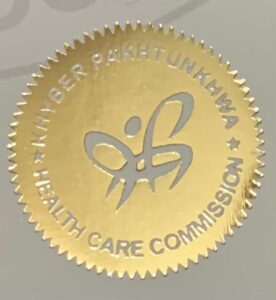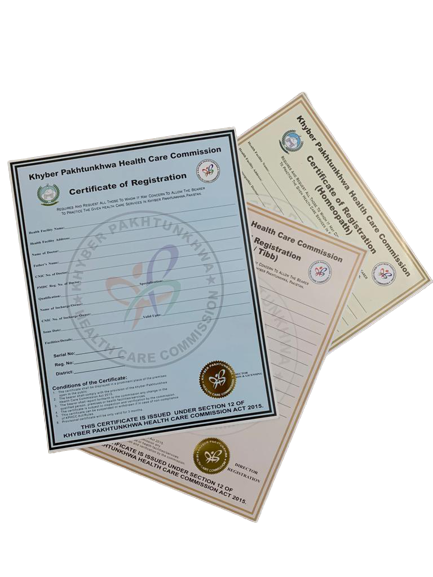Directorate of Licensing
Under Section 12 of the Khyber Pakhtunkhwa Health Care Commission Act, 2015, all Health Care Establishments (HCEs) shall get registered and licensed in order to provide healthcare services. A license is a permit granted by the Health Care Commission for the use of any premises or conveyance as a Health Care Establishment.
Health care Establishment means a hospital, diagnostic center, medical clinic, nursing home, maternity home, dental clinic, homeopathic clinic, tibb clinic or any other premises or conveyances wholly or partly used for providing healthcare services.
Legal Provision
Licensing is a mandatory process and no Healthcare Establishment can function or operate without obtaining a license from the Khyber Pakhtunkhwa Health Care Commission. The licensing focuses on implementing the Minimum Service Delivery Standards (MSDS) for the provision of healthcare services. It sets the standards that HCEs must adhere to and implement in order to operate and provide quality medical services.
Subject to categories and timelines for the initial Licensing as laid down by the Commission, an unlicensed Healthcare Establishment shall be liable to pay a fine, which may extend up to Rupees five hundred thousand (Rs.500,000), if found to be providing healthcare services without having applied for the requisite License or without having a License, as the case may be.


Types of Licenses
There are three types of licenses:
- Provisional License is issued by the Commission to an applicant whose application for license is complete in all respect, in accordance with the provisions of the Act and section 11 of the Khyber Pakhtunkhwa Health Care Commission Conduct of Business Regulations, 2016.
- Conditional License is issued by the Commission to an applicant who has already been granted a Provisional License, and after inspection, achieves overall compliance of 60 percent or more (aggregate score) provided no indicator score is less than 50 percent.
- Regular License is issued by the Commission to an Applicant, who after inspection, fully complies with the provisions of the Act, Regulations as well as the Minimum Service Delivery Standard specified by the Commission. The Regular License is for three years.
Licensing Process
Following is the procedure for getting license from the Health Care Commission:
- A health care establishment shall apply for a License on the prescribed form along with relevant documents, either prior to the commencement of the operation of a health care establishment, or six (6) months prior to the expiry of the existing license.
- The Commission shall, on receipt of an application, complete with all required documents under Rule 11, issue a provisional license to the health care establishment and shall prepare a plan for inspection.
- The Commission, before issuing the Regular or Conditional License, shall inspect the healthcare establishment, which is to be licensed, or cause such health care establishment to be inspected by an inspection team.
- Applicants must demonstrate satisfactory evidence of compliance with all the laws and the rules as applicable in this regard, from time to time.
- The Applicant shall retain a copy of the application and its attachments as submitted to the Directorate of Registration and Licensing.
- The Commission will have the right to seek further information before issuing a Provisional License.
- A Regular or Conditional License, as the case may be, based on the inspection of the health care establishment by the Commission, must be issued within time as may be fixed by the Commission, from the date of acceptance of the application. The applicant will inform the Commission about the fulfillment of the condition, after which the Commission will undertake an inspection and then issue a Regular License.
- The Commission may reject the application for License or its renewal, as the case may be, if, despite notice issued by the directorate, the applicant fails to provide the requisite information and/or supporting documents required by the directorate, within the timeline given by it.
- An applicant, whose application has been rejected, may re-apply after complying with all the requisite requirements, as prescribed. The inspection process will have to be undertaken before the license can be issued.
Quackery
Under section 28(2) of the Khyber Pakhtunkhwa Health Care Commission Act, 2015 quackery is non-bailable and cognizable offence, and according to section 28(1), quackery by a person, who does not qualify the provisions of this Act shall be punished with imprisonment, which may extend to six months or with fine, which may extend to one million rupees, or with both. All law Enforcement Agencies of Government shall provide assistance to the Commission (section 27).
Definition of Quack
As per sub-section (g) of section 2 of the Health Care Commission Anti-quackery Regulations, 2021, quack means if he/she is:
- Duly qualified but not validly registered with Pakistan medical & Dental Council/PMC, Council for Tibb and Homeopathy, and Nursing Council; or
- Neither qualified nor registered with the relevant council; or
- Duly qualified and validly registered but providing services beyond the provisions of his /her registration; or
- Neither duly qualified nor validly registered but practicing under the name of a qualified and validly registered medical practitioner.
Anti-quackery Strategy
The Khyber Pakhtunkhwa Health Care Commission has developed and Gazette notified the Anti-quackery regulations, 2021 and has established the Anti-quackery Cell under the Directorate of Licensing & Registration. KP HCC is determined to eradicate quackery through multi-pronged strategy:
- Excluding quacks through registration and licensing of qualified healthcare professionals;
- Conducting regular anti-quackery campaigns throughout the province;
- Online and manual complaint management system to ensure that unqualified/unregistered practitioners and unlawful health care establishments are brought to justice.
- Public awareness to join hands with KP HCC for eradication of the menace of quackery and ensuring safety of patients. This can be achieved through fulfilling their social obligation of not to get treatment from quacks and identify malpractices and maladministration in healthcare settings.

